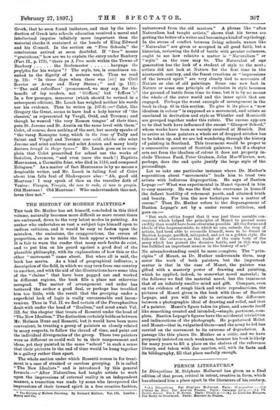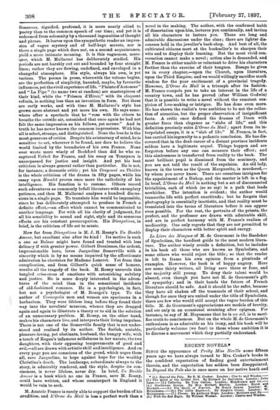FRENCH LITERATURE.* IN Divagations M. Stephane Mallarme has given us
a final edition of that prose, critical in intent, creative in form, which has obtained him a place apart in the literature of his century.
• (1.) Divagations. Par 8t6phana Mallarm6. Paris: Cbarpentior —(t) L'Ortne du Mail. Par Anatole France. Paris Calmann Levy.—,3.) Us Double Amour. Par J. H. Ronny. Patio : Cbaill..y.—(4.) Le Lien's dos Mugu's. Par Remy de Gonrmont. Paris: Mercnre de France. Sonorous, dignified, profound, it is more nearly allied to poetry than to the common speech of our time; and yet it is redeemed from solemnity by a thousand ingenuities of thought and phrase. It leaves upon the sympathetic reader an impres- sion of vague mystery and of half-kept secrets, nor is there a single page which does not, on a second acquaintance, yield a more intimate meaning. It is this vagueness, more- pver, which M. Mallarme has deliberately studied. His periods are not harshly cut out and bounded by four straight lines ; rather they are flowing, undefined, and enveloped in a changeful atmosphere. His style, always his own, is yet various. The poems in prose, wherewith the volume begins, are the perfection of simplicity, haunted, maybe, by favourite influences, yet the vivid experience of life. " Plainte d'Automne " and " La Pipe " (to name two at random) are masterpieces of their kind, while the " Frisson d'Hiver," with its eloquent refrain, is nothing less than an invention in form. But these are early works, and with time M. M.allarme's style has grown more abstract and yet more his own. He says some- where after a spectacle that he " rose with the others to breathe the outside air, astonished that once again he had not felt the same impression as his fellows, yet serene." And in truth he has never known the common impressions. With him all is select, strange, and distinguished. None the less he is the most generous of critics. Despite his aristocracy of mind, he is sensitive to art, wherever it be found, nor does he believe the world limited by the boundaries of his own France. None ever wrote more wisely of Beckford than did he who re- captured Vathek for France, and his essay on Tennyson is unsurpassed for justice and insight. And yet his best criticism is always general rather than particular. He is not, for instance, a dramatic critic ; yet his Crayonne au Theatre is the whole criticism of the drama in fifty pages, while his essay upon Hamlet proves once more the catholicity of his intelligence. His function is to resume. Others record such adventures as commonly befall literature with exemplary patience, and then M. Mallarme analyses a hundred discus- sions in a single page. To translate him would be impossible, since he has deliberately attempted to produce in French a definite effect,—an effect which cannot be communicated to another language. For with all his clarity of judgment, for all his sensibility to sound and sight, style and its sonorous effects are his constant preoccupation. His Divagations, in brief, is the criticism of life set to music.
How far from Divagations is M. J. H. Rosny's Un Double Amour, but excellent also after its kind ! Its motive is such a one as Balzac might have found and treated with less delicacy if with greater power. Gilbert Deraismes, the ardent, impressionable hero, loves Jacqueline Somerville with a sincerity which is by no means impaired by the affectionate admiration he cherishes for Madame Lancret. Yet from this -complication, and from Gilbert's quick sense of honour, results all the tragedy of the book. M. Rosny unravels this tangled criss-cross of emotions with astonishing subtlety and justice. He is more deeply interested in the adven- tures of the mind than in the sensational incidents of old-fashioned romance. He is a psychologist, in fact, but not a psychologist of M. Bourget's type. To the author of Cosmopolis men and women are specimens in a herbarium. They were lifeless long before they found their way into the novelists' museum, whence they are dragged again and again to illustrate a theory or to aid in the solution of an unnecessary problem. M. Rosny, on the other hand, makes his characters live, and interprets their living impulses. There is not one of the Somerville family that is not under- stood and realised by its author. The foolish, amiable, pleasure-loving, yet obstinate, husband, the hungry wife, with a touch of Regan's infamous selfishness in her nature, the two daughters, with their opposing temperaments of good and evil,—all are drawn with artistic skill and intelligence. And on every page you are conscious of the greed, which urges them all, save Jacqueline, to hope against hope for the wealthy Christina's death. The landscape, subordinate always to the story, is admirably rendered, and the style, despite its con- ciseness, is never lifeless, never dry. In brief, Un Double Amour is a book which no one in France, save M. Rosny, could have written, and whose counterpart in England it would be vain to seek.
M. Anatole France is rarely able to support the burden of his erudition, and L'Orme du Mail is less a perfect work than a novel in the making. The author, with the confirmed habit of dissertation upon him, lectures you continually, and invites all his characters to lecture you. There are long and admirable discussions under the elms; there are lighter dis- courses held in the jeweller's back-shop. And best of all, the cultivated citizens meet at the bookseller's to sharpen their wits and to display their learning. But the most vivid con- versation cannot make a novel; action also is demanded, and M. France is either unable or reluctant to drive his characters further than the exercise of their tongues. Essays he gives us in every chapter,—upon the Church, upon literature, upon the Third Empire; and we would willingly sacrifice much wisdom for the poor excitement of a provincial tragedy. However, L'Orme du Mail is a triumph after its fashion. M. France compels you to take an interest in the life of a country town, and he has proved (after William Godwin) that it is possible to write a novel without the remotest sus- picion of love-making or intrigue. He has done even more. He has shown the realist's true ambition to be not the collec- tion of atrocities, but the proper observation of insignificant facts. A critic once defined the dramas of Ibsen with greater force than elegance as "slabs of life," and this definition precisely suits L'Orme du Mail ; apart from its in- terpolated essays, it is a "slab of life." M. France, in fact, has carried his ingenuity to a pedantic conclusion. He has dis- covered that in the drab career of a distant province incidents seldom have a legitimate sequel. Things happen and are forgotten before any one can measure their effect; and this aimlessness is transferred from reality to the book. The most brilliant pupil is dismissed from the seminary, and you are not told the result of the expulsion. An old lady, known in the town as the Queen Marguerite, is murdered,— by whom you never know. There are countless intrigues for the appointment of a Bishop, and the matter is left in a fog. In brief, L'Orme du Mail is nothing but a set of disconnected trivialities, each of which (so so say) is a path that leads nowhither. The intention is evident ; the author would transcribe life with perfect exactitude ; but he forgets that photography is essentially inartistic, and that reality must be translated into the terms of literature before it can appear even possible. For the rest, the portraits of the priests, the prefect, and the professor are drawn with admirable skill, and are in perfect harmony with M. France's realism of mediocrity. One only regrets that they are not permitted to display their characters with better spirit and energy.
Le Livre des Masques of M. de Gourmont is the Baedeker of Symbolism, the handiest guide to the most modern litera- ture. The author wisely avoids a definition, but he includes in his book all those who are known as Symbolists, and some others who would reject the title ; so that the reader is left to frame his own opinion from a plenitude of examples. However, the book is of happy augury. Here are some thirty writers, all living save three or four, and the majority still young. To deny their talent would be absurd, even though you have not M. de Gourmont's gift of sympathy ; and in their hands the future of French literature should be safe. And it should be the safer, because they have all shaken off the trammels of their school, and though for once they are united under the title of Symbolists, there are few who would still accept the vague burden of this title. M. de Gourmont's appreciations are models of brevity, and err only in an occasional straining after epigram. For instance, to say of M. Huysmans that he is un tail, is to sacri- fice truth to conciseness. But on the whole M. de Gourmont's enthusiasm is as admirable as his irony, and his book will be particularly welcome (we fear) to those whose ambition it is to discuss a movement which they partially understand.



































 Previous page
Previous page